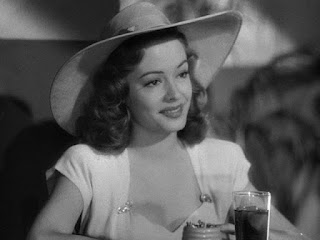 |
| Yvonne De Carlo and Tony Martin |
CASBAH (1948). Director: John Berry.
Thief Pepe le Moko (Tony Martin) hides out in the Casbah while the friendly cop Slimane (Peter Lorre) hopes he'll step out of his safe harbor so he can arrest him. Pepe falls for Gaby (Marta Toren), who is the fiancee of the wealthy Claude (Herbert Rudley of
Decoy), inspiring jealousy both in Claude and in Inez (Yvonne De Carlo), who thinks of herself as Pepe's one true love. Naturally, nobody's plans work out as they intended. It was only a matter of time before someone got the idea of making a musical out of the Pepe le Moko story -- filmed at least twice before as
Pepe le Moko and
Algiers -- and this is the closest you'll ever get, as this is what you might call a semi-musical remake with crooner Martin singing a couple of vaguely pleasant tunes by Harold Arlen and Leo Robin (Martin is in splendid voice).
Casbah is not nearly as bad as you might expect, with Martin making a sexier and gruffer Pepe, and Peter Lorre spicing up the proceedings with his typically interesting portrayal of Slimane. In this version the Casbah seems less a filthy ghetto and more a mere tourist attraction, but it has at least as much artificial atmosphere as the first two versions. Unlike
Algiers,
Casbah is not a copy of
Pepe le Moko, but eliminates some characters, has different sequences, and makes Gaby even more independent than in the other versions but also less likable. Swedish actress Toren had a few uncredited parts before being "introduced" in this film as the "next Ingrid Bergman." She's adequate and managed to amass a number of credits but she died tragically young at thirty. Yvonne De Carlo is her saucy self as Inez, although she's not always photographed very flatteringly. Other cast members include Douglas Dick [
The Accused] in an unsympathetic character part; Hugo Haas as a friend of Pepe's; and the always-interesting Virginia Gregg as a friend of Gaby's. If there's any problem with
Casbah, it's that this version tries
too hard to make this some kind of tragic love story when the lovers barely know one another, are completely one-dimensional, and Martin and Toren don't even have that much chemistry together. The shot of Martin on the runway while the plane bearing Toren soars overhead is a dramatic composition but it also comes off as a little hokey considering. Interestingly, while the earlier versions only talk about how difficult it would be for the police to get a captured Pepe out of the Casbah, this version actually shows us how difficult it would be, as all of Pepe's cronies come to his rescue after he's been handcuffed, attack the cops, and free him. John Berry also directed
Tension.
Verdict: The odd but arresting duo of Martin and Lorre almost make this work. **1/2.















